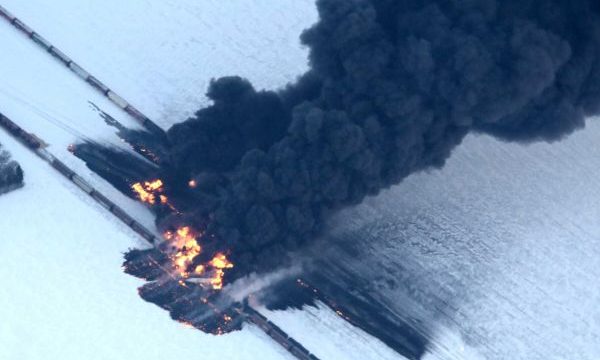Oil Train Derailments "Raising Eyebrows On Wall Street"

If there was any doubt that the build-out of pipeline infrastructure is of vital importance for North Dakota and the Bakken oil fields, consider that the recent derailments of trains carrying Bakken crude haven’t gone unnoticed on Wall Street (via Aaron Flint):
Recent accidents involving crude oil being shipped from the Bakken area of North Dakota and Montana are raising eyebrows on Wall Street and have analysts looking at companies that could be exposed to new rules governing oil shipments from the region.
Mizuho analyst John Malone said in a research note that costs related to “stricter transport standards could squeeze margins further” on oil out of Bakken.
Malone cited several stocks that had the potential to suffer as a result, including Hess, Marathon Oil, Continental Resources, Oasis Petroleum, EOG Resources, Whiting Petroleum, Nostrum Oil & Gas, Kodiak Oil & Gas and Triangle Petroleum.
Producing oil is one thing. Getting that oil to market is quite another. The only reason the Bakken has been able to flourish the way it has is that rail capacity has been available to get the oil to market. But now it’s clear that the rails may be running over capacity.
There are things which need to be done to make rail transport of oil safer – not the least of which is a faster transition to new double-hull tanker cars – but we also need to end the political obstructionism that has created an imbalance in transportation infrastructure serving the Bakken.
The Keystone XL pipeline expansion is the most well-known of the projects. Senator Heidi Heitkamp campaigned on getting approval for it, though either because of pressure from Democrats nationally or because of her strong financial ties to Warren Buffett, she’s gone mostly silent on the project since taking office. But Keystone is hardly the only pipeline that would serve the Bakken facing opposition.
The Sandpiper line, which would run across North Dakota and Minnesota to Wisconsin, could take as much as 25% of the Bakken’s current output but may not be built due to opposition in Minnesota.
If rail shipments become a problem, and pipeline infrastructure continues to be obstructed, it could be a major blow to Bakken growth and the economic prosperity it’s driving for North Dakota.




